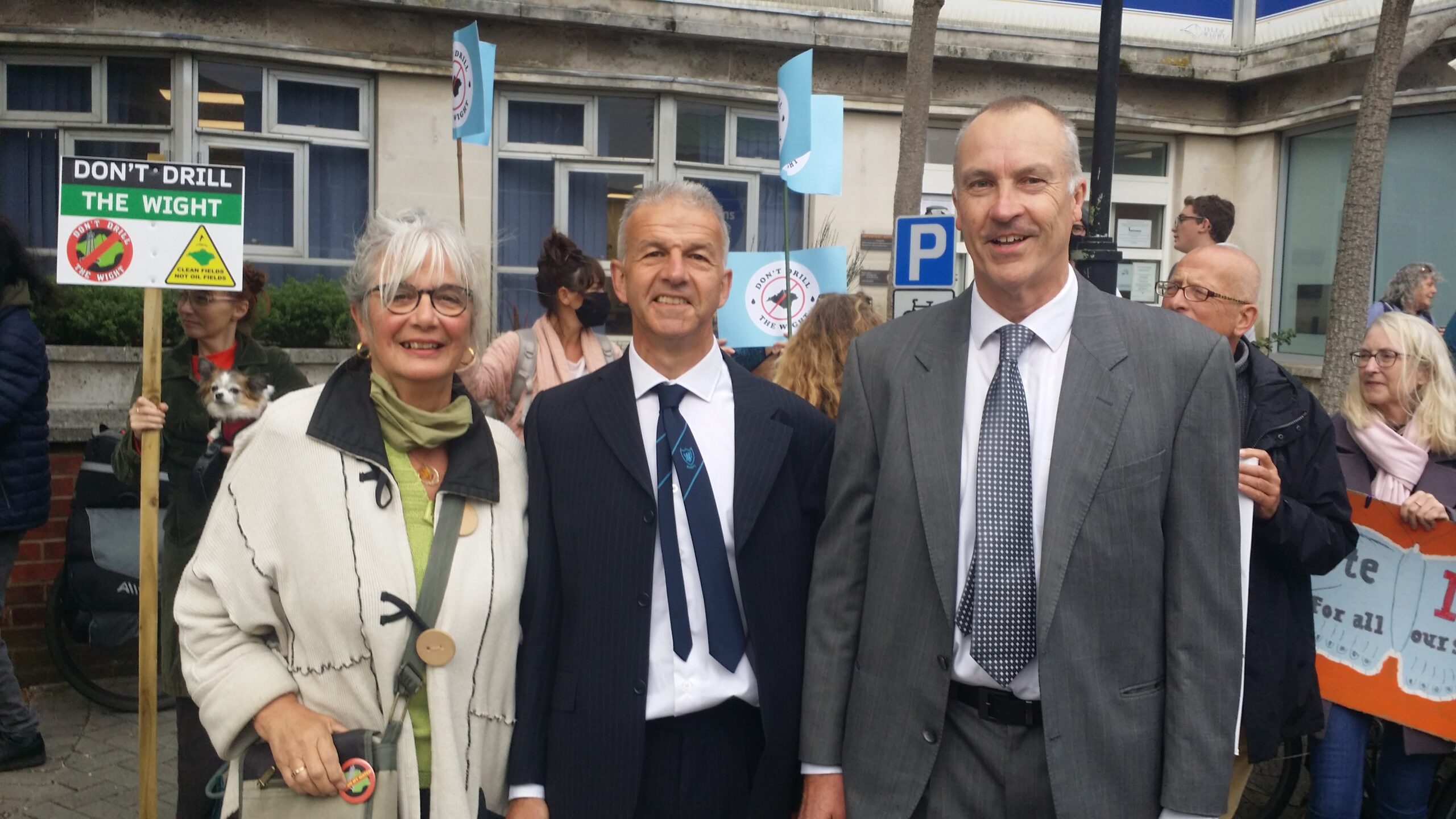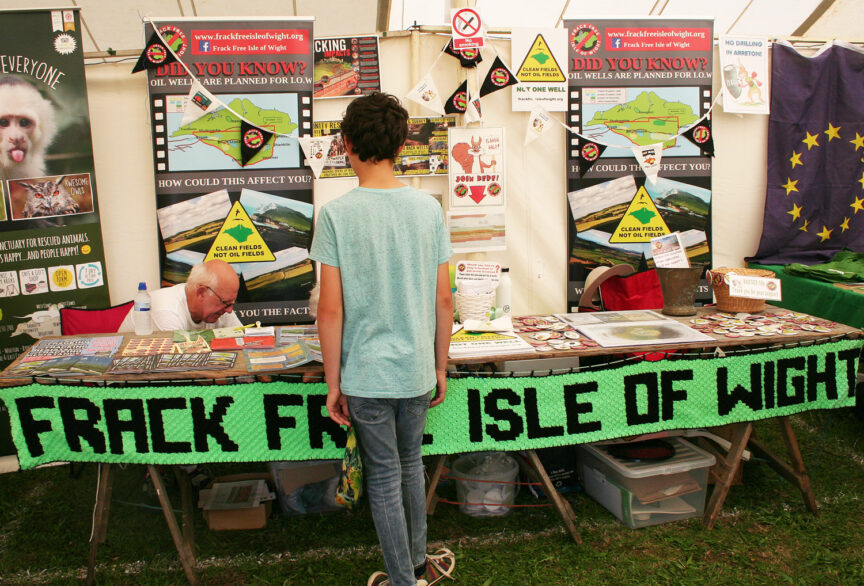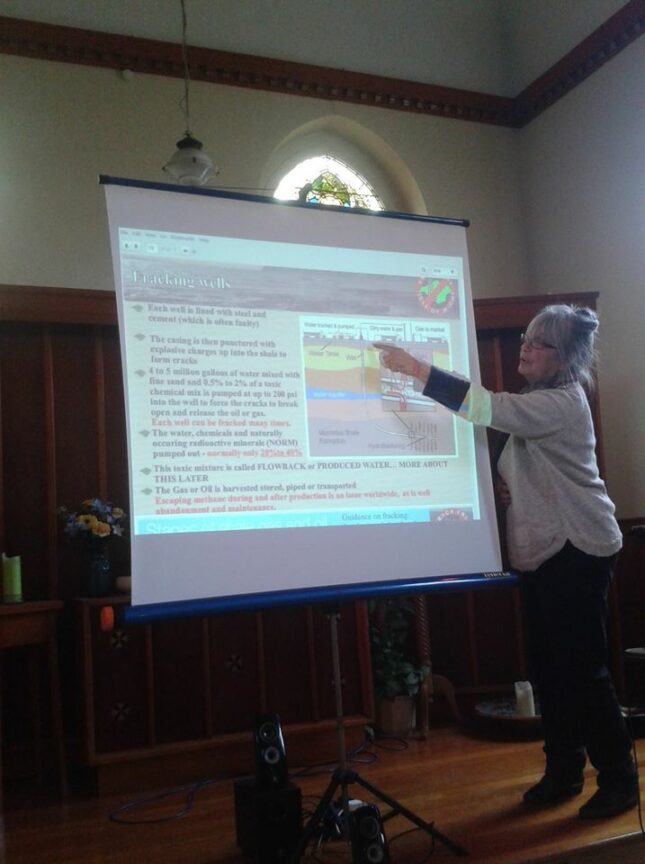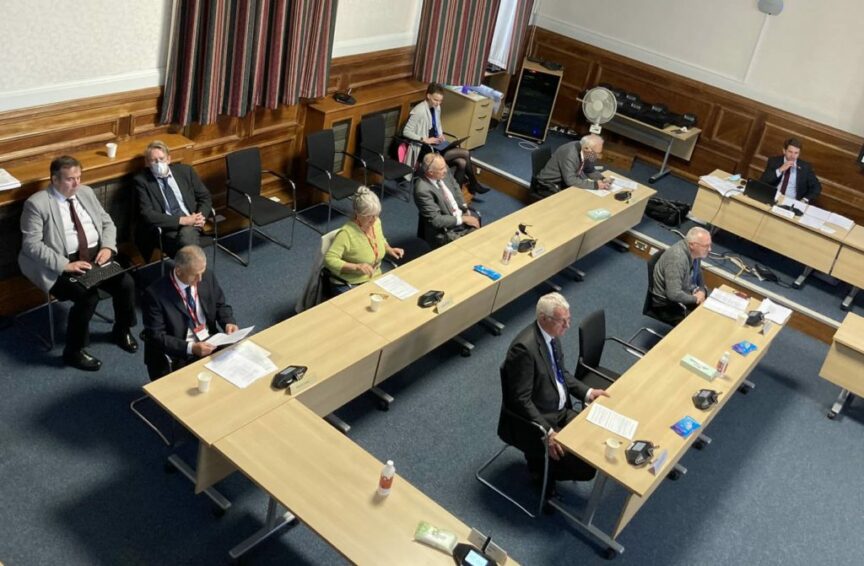How We Won: The Local Activists That Took on Big Oil on the Isle of Wight
‘It proves that David can overcome Goliath.’
by Florence Wildblood
23 November 2021

How do you stay motivated after six years of campaigning? That was the question Sylvia May had to ask herself when, last month, council planning officers recommended that a proposal to drill for oil on the Isle of Wight be approved.
“The social and environmental impacts of the development would be less than significant and would be outweighed by the substantial economic benefits,” the officers wrote, days before the planning committee meeting that would determine the outcome of over half a decade of organising by May and a small group of activists. It was a real kick in the teeth.
May, a former headteacher, co-runs Don’t Drill The Wight (DDTW), a group set up to represent residents opposed to fossil fuel development on the Isle of Wight. Together with another, newer group, IOW Protection, DDTW was fighting a drilling application from the oil firm UK Oil and Gas (UKOG).
UKOG was hoping to drill two boreholes in the Arreton valley and had requested three years’ approval to investigate the size of the subterranean opportunity – the ambitious early estimate that drilling would yield 227m barrels of oil had, by now, given way to a more modest 18m.
Despite the planning officers’ recommendations, on 19 October, the council voted unanimously against UKOG’s proposal.
VICTORY for #DontDrillTheWight 🚨
The @iwight voted to unanimously REFUSE planning permission for exploratory #FossilFuel wells on the #IsleOfWight.
We are so proud that @iwight chose to stand up for Islanders, our environment & our community.
HUGE thanks to all involved.🌍 pic.twitter.com/eB1cQcpiyM
— Don’t Drill The Wight (@DontDrillWight) October 19, 2021
The rejection flies in the face of the humdrum trajectory that planning decisions tend to follow. All too often, the climate crisis is seen as an airy-fairy abstraction, rather than something with serious material implications.
This time, however, sympathetic councillors chose to flip the system. Thanks to the hard work of the activists, they sided with the local community and rebuked UKOG’s empty promises – avoiding tangible damage to people’s livelihoods, the local environment and the climate as a result.
While UKOG may well appeal the decision, it’s hard not to see this as a major victory, not just for the activists on the Isle of Wight, but for broader community resistance.
“Our efforts over the past two years have been intensive,” says May, “but it proves that David can overcome Goliath.”
Getting started.
May’s six-year crusade against oil exploration began as soon as she arrived on the Isle of Wight in 2015. She had come to retire, having spent the last 12 years living and working in Portugal.
May recalls being “gobsmacked” upon learning that huge swathes of the island had been approved by a government agency for potential oil exploration by Angus Energy in partnership with Solo Oil and UKOG.
Compelled to fight back, she attended a meeting organised by Frack Free Isle of Wight, a local group set up in anticipation that fracking would be the result of the exploration.
“It all started with a Facebook page, a basic website and meetings run by the group to get the ball rolling,” explains May. “We focused on physical communication, which necessitated research – to ensure that what we were saying was factual and informed. I offered to be a public speaker as I had lots of experience as a teacher and headteacher, so I started to hold my own public meetings.”

But this all changed when UKOG explicitly ruled out fracking on the island. That decision, coupled with the government announcing a moratorium on fracking, prompted many activists to leave the group, which, in their eyes, had now been rendered obsolete.
May and a “small handful of others”, however, were not so convinced, and vowed to resist UKOG’s plans, revealed in a community meeting at the end of 2019. While they did not involve fracking, they would involve conventional drilling, hydrocarbon testing and – pending the success of this exploratory stage – up to 25 years of ensuing oil production. This tactical shift by UKOG led May and her fellow former Frack Free activists to adopt a broader name: Don’t Drill The Wight.
Aside from their scepticism about UKOG’s anti-fracking position, DDTW activists were driven by a passionate opposition to any and all fossil fuel exploitation. They were unimpressed by the oil firm’s argument that the economic benefits of oil discovery outweighed its environmental impact, and also saw through its ‘we’re not like the other guys’ image.
In its marketing material, UKOG emphasises the need for “energy security” in the lead-up to net-zero, and argues that we’ll need oil for things like plastic and fertilisers for years to come. Producing this domestically, rather than abroad, is, it asserts, a climate-positive step. “Indigenous oil and gas is the bridge towards the renewables that we need,” said the company’s commercial director, Matt Cartwright.
DDTW however, saw UKOG’s strategy for what it is: corporate greenwashing.
Uncovering skeletons.
When UKOG hosted a community meeting on 16 December 2019 in order to talk about its drilling plans, it “kickstarted the past few years of more intense activity”, explains May.
Team UKOG just returned from Isle of Wight Arreton drill sites visit. Received supportive warm welcome. Full speed ahead towards 2020 drilling campaign pic.twitter.com/npeKHjCWzn
— UKOG (@UKOGlistedonAIM) February 4, 2019
Ironically, the fact that the group was now a lot smaller was a strength. “It made it easier to make decisions and form a plan,” says May. That plan involved building a detailed case against UKOG, its proposal, and drilling on the island in general.
As the activists pored over UKOG’s site research, investor presentations and financial statements, skeleton upon skeleton revealed itself. First, there were the two previous expeditions (by BP and then by British Gas) that had tried and failed to dredge up oil from beneath Arreton’s surface; then there was UKOG’s 50% acquisition of an oil license in Turkey, which contradicted the firm’s ‘domestic oil’ philosophy; not to mention the stock market placings that accompanied each of the company’s proposal announcements, bringing in further investment, despite a 40% reduction in the company’s earnings over the past five years.
UKOG was playing the stock market, the activists argued, and the island was a mere pawn on its corporate chessboard.
Changing minds.
Armed with a wealth of evidence, the challenge was now for the group to present it “in a way that was understandable to as many local people as possible,” says May – and they didn’t take the challenge lightly. The group disseminated their information through myriad channels; one-on-one conversations with concerned locals, public gatherings, peaceful demonstrations, school presentations, banners and leaflets, and local media appearances.

Thinking strategically, they decided to specifically target individuals, whose “livelihoods were particularly at risk”, appealing to the interests of “local businesses and landlords”. They also reached out to “each parish and town council in proximity to the key sites” as a means of “offering support and encouragement to maintain their stance in opposition”.
Working directly to convince local authorities was crucial, says May, because “both the Parish Council and the Ward Councillor’s statements carried weight during consideration of the application by the planning committee.”
DDTW’s gentle but unrelenting approach to sharing information worked, with the activists gradually wearing down sceptical residents and authorities. “I think that councillors and officers began to realise that we actually did understand what we were talking about,” says May, “and that we could have a responsible dialogue with them.”
A new strategy.
With the group making promising but slow inroads with their traditional door-knocking approach, the introduction of online activism into their strategic arsenal ratcheted up the campaign in both its reach and impact.
Bea Stark was in her final year at school when she first heard of UKOG’s plans. “My uncle…mentioned that UKOG had submitted a planning application to begin exploratory oil drilling,” she recalls, describing how she was“filled with a desire to rally against [it] and protect my home”.
Stark quickly set up an Instagram page called IOW Protection and began drumming up support from her peers. With plans and holidays cancelled due to the pandemic, suddenly, young people found themselves with plenty of time on their hands – time that they could dedicate to the campaign.
Taking advantage of this unique opportunity, Stark encouraged her followers to “make their own placards and repost their images of them holding them online in order to show their support”. She made use of her “established social media connections to create a ripple effect, and mobilise the island youth into action”.
View this post on Instagram
Meanwhile, DDTW were also trying to make their campaign more technologically savvy. “Coronavirus stopped us from being able to hold public meetings,” says May, “but it energised us to become much more aware of using social media.” As an older group of activists, they recognised their limitations and hired “an expert”, Maria Bell, a photographer based between London and the Isle of Wight, to devise a social media strategy. “She changed our world,” says May.
Thanks to the multiplying power of social media, DDTW were able to get their message out to more people – more quickly than was feasible in person. With both groups posting regularly on their social accounts, and coordinating their efforts, news of UKOG’s proposals spread far beyond the Isle of Wight. It reached environmentalists not just in the UK, but all over the world, and caught the eye of both the national and international press.
A snowball effect.
With UKOG’s planning application by this point open for comments from the public, DDTW and IOW Protection began working together in a bid to turn growing social media disquiet into direct action. They knew paint-splashed banners and oil-soaked portraits would do little to sway the council, so instead resolved to work within the confines of its planning system.
Posting video tutorials and simple written instructions, the activists ushered their followers through the formalities of the council’s planning portal, explaining things like how to leave a comment, and what to include to ensure it was considered relevant. It proved to be an effective strategy; 3,400 people made written objections between June 2020 and March 2021.
When, this July, UKOG sought a permit from the Environment Agency, further comments were encouraged. An afternoon of online action, where opponents to drilling were encouraged to “bombard” the EA and IOW council accounts with mentions, was also organised.
“We were able to convert interaction with our page into objections – no mean feat considering how difficult to access council planning portals can be,” says Stark. “However, we found that once we had gained some traction, there was a snowball effect with submissions.”
The effectiveness of their strategy is perhaps best exemplified by a comment from one of UKOG’s shareholders, who wrote on an investor forum:
“Is anybody else concerned by the young people on the IOW? There’s a social media storm (if it can be called a storm in such a small community) coming from some teens who oppose the planning application there.”
View this post on Instagram
As summer drifted into autumn, and the meeting date was set, there was little to do but wait. Final emails were sent to councillors; the support of MP Bob Seeley, Arreton Parish Council, Hampshire and IOW Wildlife Trust, and the IOW Biosphere Reserve, was confirmed.
After six years of organising, the council was finally going to make a decision.
The final verdict.
The meeting took place in the late afternoon on 19 October at the Isle of Wight County Hall. Attendees were met on arrival by protestors with placards.
The DDTW activists were given the opportunity to speak, with May calling out UKOG for its “lack of due diligence”. Another activist, Jon Idle, made a compelling case against the plan, pointing out that the yield would provide just two weeks’ worth of oil – as per the UK’s current rate of use.

What’s more, the months of relationship-building and constructive dialogue had paid off, with councillors themselves citing threats to tourism and island infrastructure, and disruption to local biodiversity as reasons for opposing UKOG’s plans. One councillor suggested drilling for oil was in clear contravention of the island’s climate change policy; “I can only see negatives. The damage could be catastrophic,” said another.
These may seem like obvious complaints but – with 111 oil and gas projects expected to commence in the UK across 2021-25 – the tide is yet to turn against oil exploration.
Eventually, every single councillor present voted against the plans – in direct contravention of the report released in the days before the meeting. “I want… to thank all of those Islanders who submitted objections,” said May, “those that signed our petition, and our members and subscribers that have stood beside us all along the way. We could not have done this without you.”
Say it loud, say it clear – oil drilling not welcome here!
WHAT DO WE HAVE climate crisis, WHEN SHALL WE FIX IT? NOW!
Say it loud and all around FOSSIL FUELS STAY IN THE GROUND!Don’t Drill, The Wight! pic.twitter.com/13EMHVH6D1
— Vix Lowthion 💚 (@VixL) October 19, 2021
What next?
The tactics used by DDTW and IOW Protection show that it’s possible to play an antiquated system to elicit 21st-century results. Their campaign proves that large numbers of people can be educated in strategies for rallying against environmental destruction. It also exemplifies an effective way to convert social media hype into resistance that matters to decision-makers.
And this win is not an anomaly. Just this month, a council ruled out oil drilling in Lincolnshire, after more than 1,700 residents signed a petition against it.
Victories like these prove just how essential grassroots organising is in the fight for a greener society – and that it really is possible for communities to take on fossil fuel firms and win.
That said, activism is only one part of the puzzle. In tackling the climate crisis, it is also vital that the government gets out of bed with fossil fuel companies, as Vix Lothian, a spokesperson for the Isle of Wight Green party, said in the wake of UKOG’s defeat:
“This fight was only necessary because of the Conservative government’s overwhelming support for the fossil fuel industry. Last year they awarded £10.5bn in subsidies and incentives for fossil fuels, which was the highest amount in Europe.
“The next steps for our political leaders must be to ban all new fossil fuel exploitation in the UK. If they are serious about tackling the climate crisis, then they must invest in clean, renewable energy and leave the fossil fuels in the ground.”
Activists like May will be key in applying pressure on the government to make this change. But for now, she is enjoying some well-earned rest: “We have done all we can… there is a sense of achievement and so, so much gratitude.”
Stark, meanwhile, is busy studying at university. “This victory means everything to me,” she says, “because it proves that against all the odds together we had the power to protect our home from the interest of big business.”
Florence Wildblood is the editor of Ours to Save and a writer/researcher for Courier Media and Byline Investigates.


